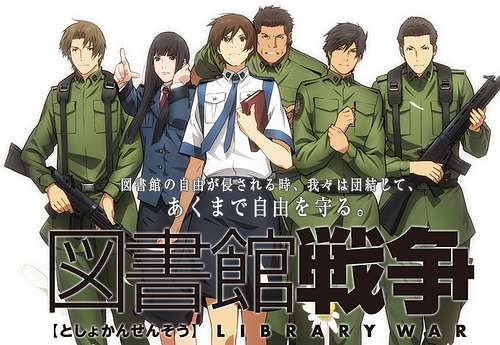Library War and Intertextuality
Being about books, Library War also presents fitting intertextuality in mentioning Fahrenheit 451 by Ray Bradbury where “firemen” are employed to burns books, a beautifully written irony. The book was censored in this series because its subject matter is related to what the Media Enhancement Commissions really does. There is also another possible reference to Nineteen Eighty-Four by George Orwell, in the purpose of the Library Future Planning to make a future without censorship, which actually means a future where opinion and information have been controlled. Just as the Ministry of Truth in Nineteen Eighty-Four where Winston Smith works manipulates historical documents (Big Brother is watching!).
Character Development
The story of the series is focused on Iku Kasahara in the Task Force and her relationship with her superior, Atsushi Dojo. I happen to have been reading developmental psychology book at the time I watched the anime, and it felt so relatable that I started to think that the creator may actually be a psychologist (and a librarian, maybe a bibliotherapist).
The first thing that comes up to my mind is the moment when Kasahara was told to retire as a librarian in the Library Defense Force by her parents (especially her mother), because they thought it is too dangerous for a woman to join a military force. Regarding developmental psychology theories by Desmita (2005), Kasahara shows the development of her relationship with her parents, that she struggles for autonomy, physically or psychologically. She acted against her mother’s opinion, realizing that she has to respect her parents but also acknowledging that parents are not always right and an be wrong. She develops personal ideas and makes life decisions by herself.

For more than half of the series, Kasahara was looking for her ideal “prince,” a librarian that saved her banned book in high school. Her idealism went through motivated-reasoning (regarding Festiger, 1956), that she wants to believe in something (one day she will become an ideal librarian), then the search for supporting evidence (her acquaintances’ support), and when she finds the piece of evidence (her superior’s trust), she gives herself permission to believe. Then, the remaining episodes show the mental development of Kasahara as an adult, the changing of abstract and ideal thinking into realistic and pragmatic thinking. That was when Kasahara said that she wants to stop looking for her “prince” and starts to be a librarian by herself.
The other example is the hang in Kasahara’s problem-solving method. In an earlier episode when she decided to sacrifice herself by running in front of the Media Enhancement Law Commission’s force instead of waiting for help, she only uses her instinct than her logic. But later, she develops more methodic decision-making by analyzing the situation around her and the result is that she could make a certain code that allowed the intelligence specialist Shibasaki to understand her situation. Further, Kasahara Iku also develops her capacity to decide who can enter her social circle, such as in how she rejects Satoshi Tezuka to become her acquaintance and in developing her feelings towards Atsushi Dojo.
Library War may not actually be a partiularly realistic anime, but it can highlight aspects of our reality in certain ways. Thus, anime can not only give us entertainment, but also shows how our reality can be reflected by creative works.
Facts and Figures
| Alternative Title | 図書館戦争 (Toshokan Sensou) |
| Source material | Novel by Hiro Arikawa |
| Casts | Akira Ishida as Mikihisa Komaki Marina Inoue as Iku Kasahara Miyuki Sawashiro as Asako Shibasaki Tatsuhisa Suzuki as Hikaru Tezuka Tomoaki Maeno as Atsushi Dojo |
| Director | Takayuki Hamana (Crayon Shin-chan, Idaten Jump) |
| Series composition | Konuta Kenji (Diamod no Ace, Highschool DxD Hero) |
| Character Design | Satoru Nakamura |
| Studio | Production I.G |
References
- Baez, Fernando. 2004. Penghancuran Buku dari Masa ke Masa. Tangerang. Marjin Kiri.
- Desmita. 2005. Psikologi Perkembangan. Bandung. PT Remaja Rosda Karya.
- https://wikis.ala.org/professionaltips/index.php?title=Library_War_Service
- https://www.oif.ala.org/oif/?p=10636
- https://lj.libraryjournal.com/2014/09/opinion/john-berry /politics-libraries-every-great-librarian-is-a-politician-blatant-berry/
- John Feather. 2003. Libraries and Politics: When Two World Meets.
- United Nation. 2015. Universal Declaration of Human Rights.
The Indonesian Anime Times | by Vina Nurziani | the writer is a student studying library and information science



